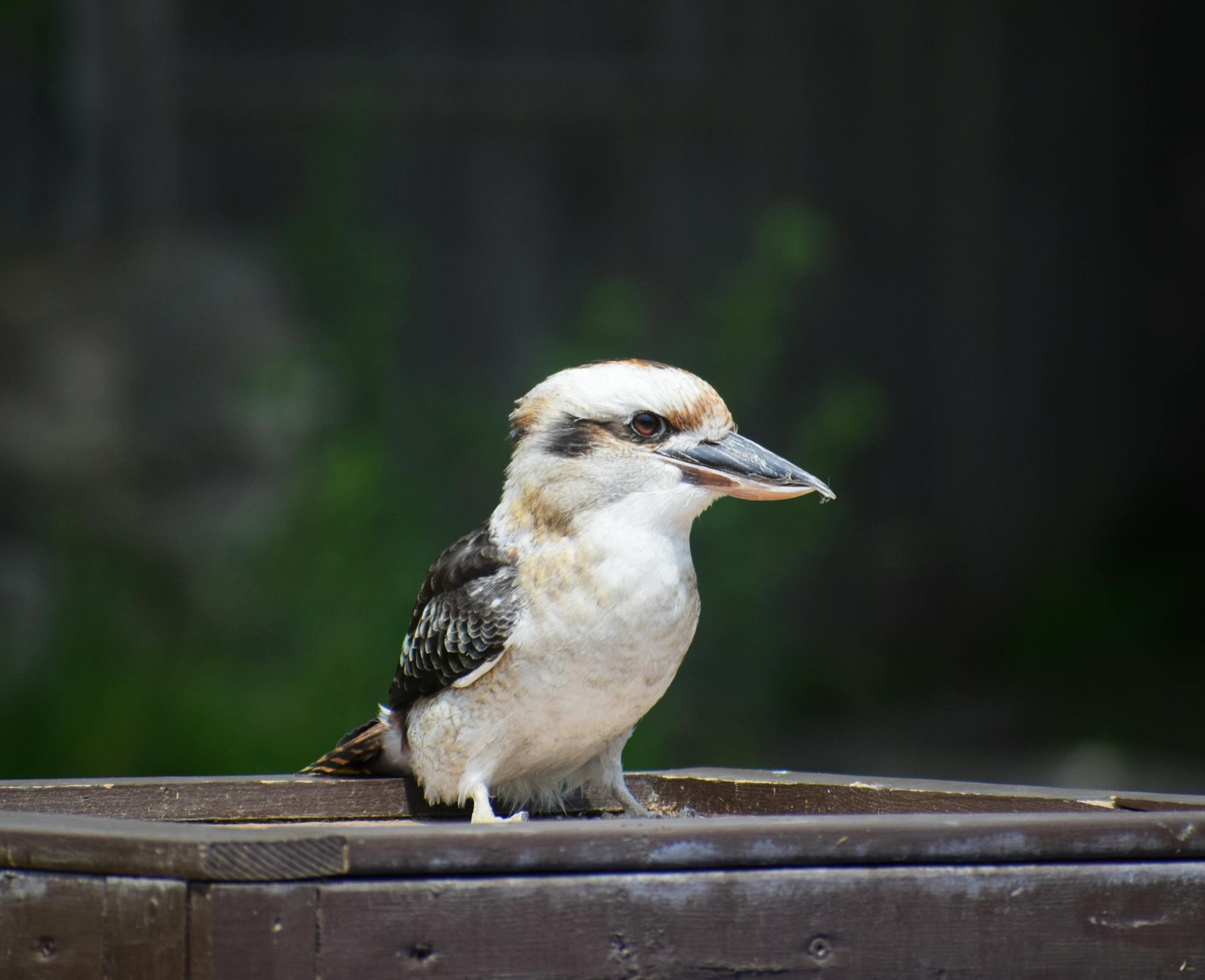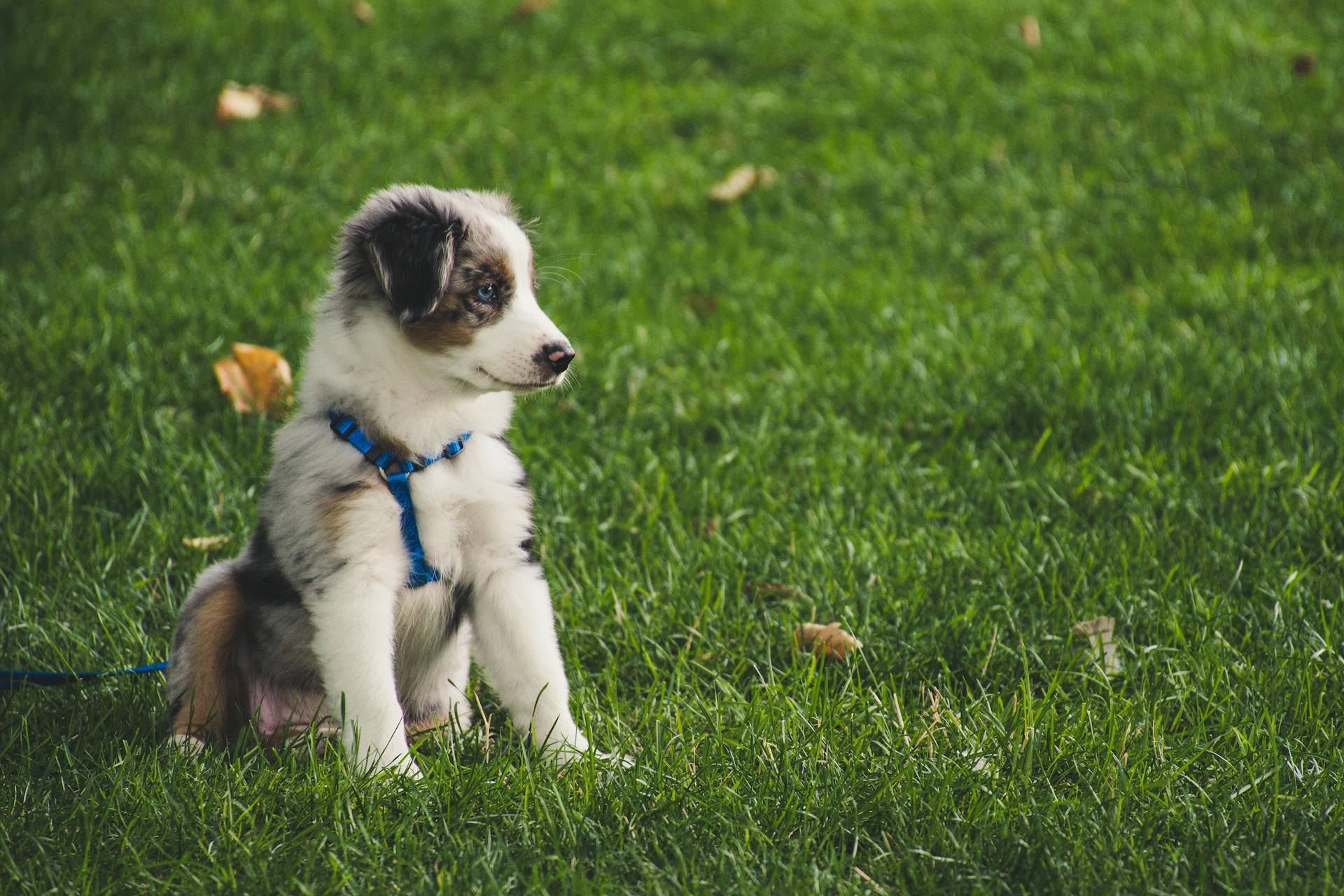
The Australian Shepherd Herding Dog Breed is a highly intelligent and energetic breed that excels in herding and agility.
Their origins date back to the 19th century in the United States, where they were bred to herd sheep and other livestock.
This breed is known for its strong herding instinct, which makes them highly effective at moving animals from one place to another.
Australian Shepherds are highly intelligent and thrive on mental and physical stimulation, making them a great fit for active families or individuals.
Their high energy levels require regular exercise and playtime to keep them happy and healthy.
You might like: Dogs Breeds That Start with B
Australian Shepherd Breed
The Australian Shepherd is a highly intelligent and trainable breed, known for its happy demeanor and distinctive merle coat. They're also incredibly versatile.
These dogs can herd sheep or cattle effectively, making them a valuable asset on farms. Their adaptability and ability to learn quickly have made them a popular choice for a variety of farm tasks.
Despite their name, Australian Shepherds were actually developed in the Western United States in the 19th and early 20th century. The breed's name is likely derived from its association with Basque shepherds who emigrated from Europe to Australia and then to the US.
Their boundless energy and keen intelligence make them a joy to work with. With proper training, an Australian Shepherd can excel in a variety of roles.
On a similar theme: What Is Dog Sledding Called
Herding Dog Traits
Herding dog breeds, like the Australian Shepherd, are working dogs at their core. Bred for specific tasks, they share several common traits that make them suited to their roles.
Herding dogs are often some of the most biddable, or easily taught, animals, which makes them a joy to train and work with. Their intelligence and willingness to please their handler make them highly responsive to commands.
These dogs are highly attuned to their handler's instructions, making quick decisions based on whistle tones, voice commands, or hand signals. This responsiveness is vital in the field, allowing the handler to control the dog's movements and the direction of the flock or herd.
Herding requires constant movement, often over long distances and for extended periods. Herding breeds are typically high-energy, or high drive, dogs with excellent stamina, able to run and work for hours without tiring.
Herding dogs need to be quick and nimble, able to change direction at a moment's notice. This agility allows them to dart around livestock, guiding them in the desired direction or intervening if an animal strays from the group.
At their core, canines are predators, but herding dogs have been domesticated to help humans corral and protect livestock. Their skills include intelligence, stamina, and a strong work ethic, making them valuable assets on farms and ranches.
Herding dog breeds have a long history of working with humans, and many have gone on to excel in other roles, such as serving in the military or working as guide dogs. Their intelligence, loyalty, and strong work ethic make them a popular choice for many dog owners.
You might like: Why Do Dogs Attack People
Physical Characteristics
The Australian Shepherd is a medium-sized dog breed. They stand slightly longer than they are tall, with males reaching 20 to 23 inches in height at the shoulder.
Males typically weigh between 50 and 65 pounds, while females weigh between 40 and 55 pounds.
The breed has a clear distinction between males and females in terms of size, with males being larger than females.
Curious to learn more? Check out: How Much Do Border Collies Weigh
Care and Management
Australian Shepherds are highly energetic dogs that require regular exercise to stay happy and healthy, with a minimum of 30 minutes of physical activity per day.
Their intelligence and high energy levels make them perfect for active families or individuals who enjoy outdoor activities.
To keep them in top shape, Australian Shepherds need regular grooming, with a weekly brushing to prevent matting and tangling of their thick coats.
Australian Shepherds are prone to certain health issues, including hip dysplasia and eye problems, so regular veterinary check-ups are essential.
With proper training and socialization, Australian Shepherds can thrive in a variety of living situations, from apartments to homes with large yards.
Their strong herding instincts mean they need mental stimulation and exercise to prevent boredom and destructive behavior.
Australian Shepherds are generally healthy dogs with an average lifespan of 12-15 years, but their longevity depends on various factors, including diet, exercise, and genetics.
Additional reading: How Much Exercise Do Border Collies Need
Dog Breeds History
The Australian Shepherd has a rich history that dates back to the 1840s, when ranchers and farmers in the western U.S. needed a dog that could herd livestock with ease.
The breed's ancestors likely include collie and shepherd-type dogs that were imported with sheep shipments from Australia, hence the name Australian Shepherd.
Breeders worked tirelessly to enhance their herding ability and create a versatile, hard-working, and intelligent dog.
The Australian Shepherd's popularity boomed in the post-World War II years, thanks in part to its athletic abilities and its ability to work alongside cowboys at rodeos and horse shows.
Despite its popularity, the American Kennel Club didn't recognize the breed until 1993.
Herding dog breeds like the Australian Shepherd have a long history of being used to corral goats and sheep, and were domesticated thousands of years ago to help humans with food sources.
Many herding dog breeds originated in areas with large, rolling pastures and unforgiving terrain, where they had to use their intelligence and stamina to maintain control and watch over herds.
The Australian Shepherd's strong herding instincts make it well-suited for work as a family companion, protector, and herding dog.
Herding dog breeds are known for their intelligence, stamina, and strong work ethic, making them excel at other jobs like serving with the military, working in police K-9 units, and becoming guide or service dogs.
A different take: How Strong Are German Shepherds
Frequently Asked Questions
What is the difference between Border Collie and Australian Shepherd herding style?
Border Collies excel at gentle, subtle herding, while Australian Shepherds are skilled at driving and moving herds over longer distances. This difference in approach is due to their unique breed characteristics and historical uses.
What are Australian sheep dogs called?
Australian sheep dogs are commonly known as Australian Shepherds or Aussies. They are a popular breed known for their intelligence and herding abilities.
Are Australian sheepdogs good pets?
Australian Shepherds can make great family pets, but they require attention to their strong herding instincts to ensure a harmonious household. With proper care and socialization, they can be a loving and loyal companion for many families.
What two breeds make an Australian Shepherd?
The Australian Shepherd was developed by crossing Pyrenean Shepherds with Collies and Border Collies. This unique blend of breeds led to the creation of the modern Australian Shepherd.
Sources
- https://www.thepioneerwoman.com/home-lifestyle/pets/g40413087/herding-dog-breeds/
- https://dogtime.com/dog-breeds/australian-shepherd
- https://www.farmstore.com/top-herding-dogs-unleashed-finding-your-perfect-farmhand/
- https://www.purewow.com/family/herding-dog-breeds
- https://showsightmagazine.com/herding-dog-breeds/
Featured Images: pexels.com


